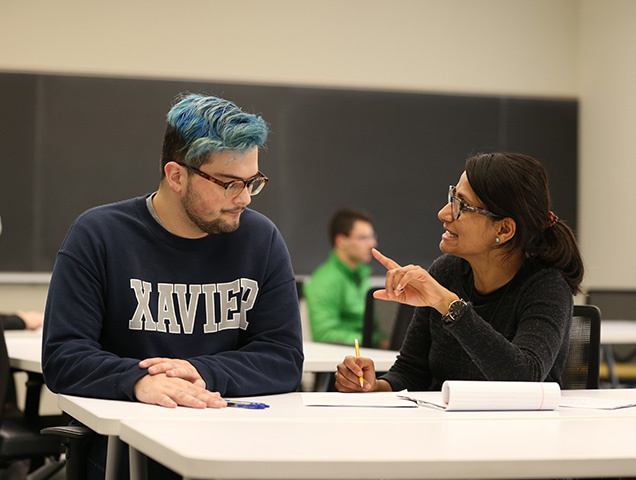Genetics
Program Details
Explore the field of genetics, from the structure of genes to their impact on human health and diversity. As a student in the genetics major at Xavier, you'll build a strong foundation in biology and chemistry while exploring modern genetics, molecular biology and genomics. From Mendel to mutations, you'll learn about inheritance and how genes are regulated. You'll also analyze genome sequences and investigate medical genetics, preparing you for careers in labs, research or graduate school.
Xavier University, located in Cincinnati, Ohio, is nationally recognized as a top university by U.S. News & World Report and The Princeton Review. 98 percent of our students are working, volunteering or in graduate school within six months of graduation (Class of 2023).
Degree Awarded
Bachelor of Science in Genetics
Curriculum
The sample course sequence below illustrates class offerings for the Genetics major. Consult the official Xavier University course catalog for detailed registration and advising information.
Fall
- BIOL 160: General Biology I............ 3cr.
- BIOL 161 General Biology I Lab............ 1cr.
- CHEM 160: General Chemistry I............ 3cr.
- CHEM 161: General Chemistry I Lab............ 1cr.
- STAT 146: Biostatistics or Mathematical Perspective Elec............ 3cr.
- THEO 111: Theological Foundations ............ 3cr.
- CORE 101: Goa I............ 0cr.
Spring
- BIOL 162: General Biology II............ 3cr.
- BIOL 163 General Biology II Lab............ 1cr.
- CHEM 162: General Chemistry II............ 3cr.
- CHEM 163 General Chemistry II Lab............ 1cr.
- ENGL 101: English Composition ............ 3cr.
- CORE 100: First Year Seminar ............ 3cr.
- CORE 101: Goa I............ 0cr.
Fall
- BIOL 240: Evolution............ 3cr.
- CHEM 240: Organic Chemistry I............ 3cr.
- CHEM 241: Organic Chemistry I Lab............ 1cr.
- STAT 146: Biostatistics or Mathematical Perspective Elec............ 3cr.
- Second Language Elective I ............ 3cr.
- BIOL 299: Professional Communication in the Sciences ............ 1cr.
Spring
- BIOL 230: Genetics............ 3cr.
- BIOL 231: Genetics Lab............ 1cr.
- CHEM 242: Organic Chemistry II............ 3cr.
- CHEM 243: Organic Chemistry II Lab............ 1cr.
- PHIL 100: Intro to Ethics ............ 3cr.
- Second Language Elective II............ 3cr.
Fall
- BIOL 232: Genomics OR BIOL 358: Adv. Molecular Biology............ 3cr.
- BIOL 364: Virology or Biology Elective............ 3cr.
- CHEM 440: Biochemistry I............ 3cr.
- ENGL 205: Literature and Moral Imagination............ 3cr.
- HIST 199: Historical Persp. Elective ............ 3cr.
Spring
- BIOL 360: Cell Biology OR BIOL 430: Medical Genetics (E/RS flag)............ 3cr.
- Biology Elective............ 3cr.
- PHIL 200: Philosophical Perspective Elective ............ 3cr.
- Social Science Elective ............ 3cr.
- Writing Flag Elective............ 3cr.
Fall
- Capstone (≥ 2 credits required)............ 1cr.
- BIOL 232: Genomics OR BIOL 358: Adv. Molecular Biology............ 3cr.
- BIOL 364: Virology OR Biology Elective............ 3cr.
- Theological Perspective Elective ............ 3cr.
- Solidarity and Kinship Flag Elective ............ 3cr.
Spring
- Capstone (≥ 2 credits required)............ 1cr.
- BIOL 360: Cell Biology OR BIOL 430: Medical Genetics (E/RS flag)............ 3cr.
- Humanities Elective ............ 3cr.
- Creative Perspectives Elective ............ 3cr.
- General Elective ............ 3cr.
Sample Courses
- Genetics/Genetics Laboratory (BIOL 230/231): Participate in hands-on laboratory exercises that immerse you in the contemporary techniques of molecular genetics while learning the fundamentals of genetics. Through an examination of fundamentals and practical experiments, you gain proficiency in manipulating and analyzing nucleic acids, fostering a deeper understanding of modern genetic methodologies.
- Virology (BIOL 364): Learn about the diversity, genetics and ecology of viruses, emphasizing impacts on human societies worldwide.
- Medical Genetics (BIOL 430): Explore the principles of human genetics, including disease risks, screening, diagnosis, and the ethical implications of genetic information.
- Biochemistry (CHEM 440): This course covers proteins, carbohydrates, lipids, and nucleic acids, exploring their structure, properties, and essential roles in cellular metabolism.
- Biostatistics (STAT 146): Master the tools of biological data analysis. This course emphasizes statistical methods relevant to the biological sciences, covering topics like sampling, data analysis, hypothesis testing, and more.
Career Outcomes
High Student Success RateAt Xavier, your career aspirations are supported by a strong network of faculty and staff. 98% of Xavier students are working, volunteering or in graduate school within six months of graduation (Class of 2023). Additionally, Xavier students have an 86% acceptance rate to medical schools (5-year average, Class of 2022), compared to 40% nationally.
Career Opportunities- Research Scientist: Conducts research to advance scientific understanding and develop new applications in genetics.
- Genetic Counselor: Provides guidance and support to individuals and families affected by genetic conditions.
- Biomedical Scientist: Develops and applies laboratory techniques to study biological processes and diseases.
- Forensic Scientist: Analyzes evidence to solve crimes and identify individuals.
- Bioinformatician: Uses computational tools to analyze and interpret genetic data.
- Science Writer or Educator: Communicates scientific information to the public or students.
- Health-related careers: physician, physician assistant, pharmacist, dentist, etc.
Xavier's Career Development Office assists students in their search for employment by offering individual career counseling sessions, conducting workshops and maintaining an employer database. More than 100 nationally known companies visit the campus annually to interview graduating seniors for open positions.
Student Clubs
Creating an on-campus community with your classmates is essential to your undergraduate studies. Not only does this enrich your life at Xavier, but it can also foster future professional connections, boost your résumé and strengthen your interpersonal skills. Our biology-related student clubs include:
- Alpha Epsilon Delta (Pre-Med Honor Society): As a junior or senior, join this national pre-health honor organization and make a difference in the Cincinnati community by volunteering at places like the Ronald McDonald House and Cincinnati Children's Hospital.
- Biology Club: Connect with like-minded biology majors and enthusiasts in this vibrant community. Explore your passion for biology, engage in hands-on learning and network with professionals in the field.
- Minorities in STEM Succeeding Together: Find a supportive community where you can thrive, connect with peers, and build confidence in your identity while pursuing excellence in STEM.
- Pre-Med Student Association: Join this club if you're interested in a career in the health professions. Attend bimonthly events, network with medical professionals and collaborate with upperclassmen on the pre-med track.
When we seek something more, we become something greater.
Find more information about how you can become a Musketeer.
Request InformationCollaborate on Ground-Breaking Research Projects

Once you’ve got the foundational lab skills down, put them to use working on projects with our faculty and other Cincinnati scientists to make original discoveries in genetics, molecular and cell biology, or bioinformatics. Roughly two-thirds of Xavier Biology students elect to participate in original research.
Courses Taught in the Jesuit Tradition

At a Jesuit University, you won't just study genes in a lab, you’ll focus on the ethical implications that shape the field of genetics. This holistic approach will equip you with a strong ethical foundation, helping you navigate the complex moral questions that arise in genetics research.
Achieve Your Health Career Goals

Want to study dentistry, vet med, podiatry, optometry, pharmacy, or PT? We can help. Our Pre-Professional Health advising program boosts your chances of getting into medical school— our students have an 86% medical school acceptance rate, compared to 40% nationally.